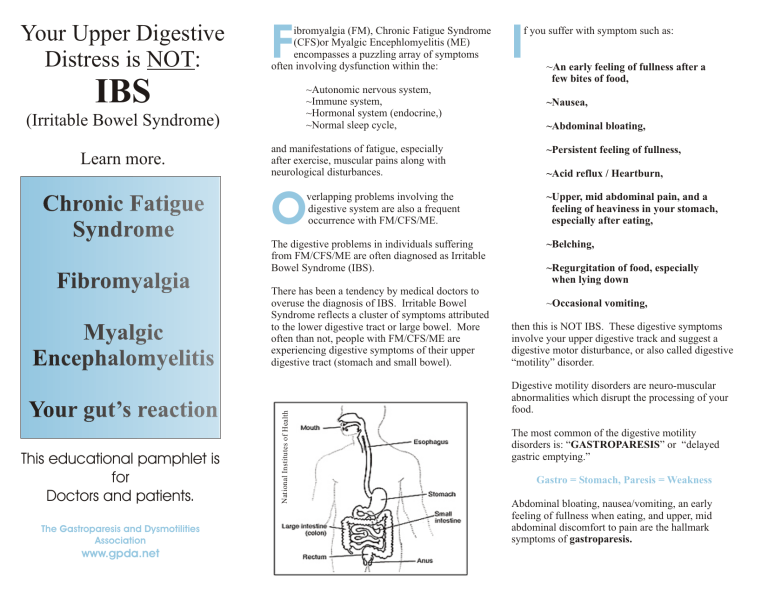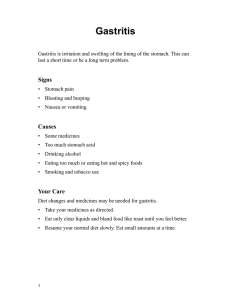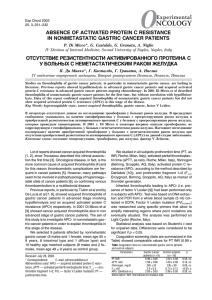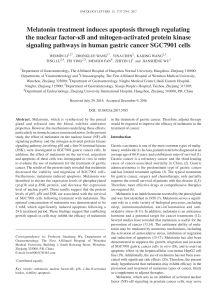
Your Upper Digestive Distress is NOT: F ibromyalgia (FM), Chronic Fatigue Syndrome (CFS)or Myalgic Encephlomyelitis (ME) encompasses a puzzling array of symptoms often involving dysfunction within the: ~Autonomic nervous system, ~Immune system, ~Hormonal system (endocrine,) ~Normal sleep cycle, (Irritable Bowel Syndrome) Fibromyalgia Myalgic Encephalomyelitis Your gut’s reaction This educational pamphlet is for Doctors and patients. The Gastroparesis and Dysmotilities Association www.gpda.net and manifestations of fatigue, especially after exercise, muscular pains along with neurological disturbances. O verlapping problems involving the digestive system are also a frequent occurrence with FM/CFS/ME. The digestive problems in individuals suffering from FM/CFS/ME are often diagnosed as Irritable Bowel Syndrome (IBS). There has been a tendency by medical doctors to overuse the diagnosis of IBS. Irritable Bowel Syndrome reflects a cluster of symptoms attributed to the lower digestive tract or large bowel. More often than not, people with FM/CFS/ME are experiencing digestive symptoms of their upper digestive tract (stomach and small bowel). National Institutes of Health Chronic Fatigue Syndrome ~An early feeling of fullness after a few bites of food, IBS Learn more. I f you suffer with symptom such as: ~Nausea, ~Abdominal bloating, ~Persistent feeling of fullness, ~Acid reflux / Heartburn, ~Upper, mid abdominal pain, and a feeling of heaviness in your stomach, especially after eating, ~Belching, ~Regurgitation of food, especially when lying down ~Occasional vomiting, then this is NOT IBS. These digestive symptoms involve your upper digestive track and suggest a digestive motor disturbance, or also called digestive “motility” disorder. Digestive motility disorders are neuro-muscular abnormalities which disrupt the processing of your food. The most common of the digestive motility disorders is: “GASTROPARESIS” or “delayed gastric emptying.” Gastro = Stomach, Paresis = Weakness Abdominal bloating, nausea/vomiting, an early feeling of fullness when eating, and upper, mid abdominal discomfort to pain are the hallmark symptoms of gastroparesis. H ow do you know if you have gastroparesis? Many findings on routine diagnostic tests may ‘tipoff’ your doctor that you have delayed gastric emptying. Some of these signs are: Upper GI study using barium and the barium does not move out of the stomach in the expected time period. Upper endoscopy performed after ‘fasting’ and food is unexpectedly found still sitting within your stomach. The American Motility Society has established standards for diagnosing gastroparesis. The diagnostic test recommended is a 4 hour “Gastric Emptying Test” (GET) or also called a Gastric Emptying scan. Ask your doctor for a Gastric Emptying Test. Another test called the Electrogastrography (EGG) helps to further define any rhythm abnormalities within the stomach which may also be contributing to your symptoms. FACTS: Primary gastroparesis is the most prevalent of all causes for gastroparesis. It may be precipitated by a viral illness like Epstein Barr Virus or a viral infection in the digestive tract--the so called “stomach flu.” Primary gastroparesis frequently involves dysfunction of the autonomic nervous system. Science has implicated an immune dysfunction as having a possible role. 70% to 80% of individuals with primary gastroparesis are young women. L earn to advocate for yourself by being informed. The biggest problem facing FM/CFS/ME sufferers is getting medical doctors to validate your suffering. This holds true when symptoms also involve your stomach. Finally, working with a dietitian, you may try food elimination and then reintroduction of certain foods in order to help identify food sensitivities that may be compounding your digestive symptoms. Science’s understanding about the workings of your stomach is still in its infancy. Just as ulcers once were attributed to stress and “type A” personalities, patients now face the same hurdles for trying to access appropriate care for their neuro-muscular problems within their stomachs! As well, more treatment options with medications are coming into use for upper digestive problems. A common drug used for treating IBS, called: Tegaserod (Zelnorm) is now being tried as a treatment for gastroparesis. Treatments for IBS and gastroparesis often differ. Getting the right treatment for your digestive problem is important. Behavioral therapies and psychological interventions do have there role to play, but not as a primary treatment approach for these upper digestive symptoms. Problems of altered digestive motility are better managed with pro-motility drugs, acid suppressing medications (when appropriate) and anti-nauseant medications if needed. Diet and alternative therapies also play a large role in symptom control. Diet management is of upmost importance to help curb symptoms. You may find that certain foods may exacerbate symptoms; therefore, consultation with a dietitian is vital. It is generally recommended to: ~Avoid high fat and high fiber foods, ~Eat small portions throughout the day, ~Try liquid food supplements (your doctor may be able to write a prescription for these supplements), ~Learn your food “boundaries”. Other common ‘pro-motility’ medications for gastroparesis are: ~Domperidone ~Reglan (metoclopromide), and ~Erythromycin. Fibromyalgia, Chronic Fatigue Syndrome, Myalgic Encephlomyelitis share many overlapping similarities with primary gastroparesis (also called Idiopathic gastroparesis). Idiopathic gastroparesis represents a mixed bag of suspected causes. This puzzling neuro-muscular disorder of the stomach is under-recognized and often takes years to diagnose. For many with idiopathic gastroparesis, it is closely coupled to FM/CFS/ME and with more research may demonstrate that, for some, it is part of the same clinical picture. The Gastroparesis and Dysmotilities Association is a Canadian registered Non-profit charity dedicated to increasing awareness about digestive motility diseases/disorders. GPDA: 5520 Dalhart Hill NW Calgary, AB, T3A 1S9 403-247-3215 jkf@gpda.net






